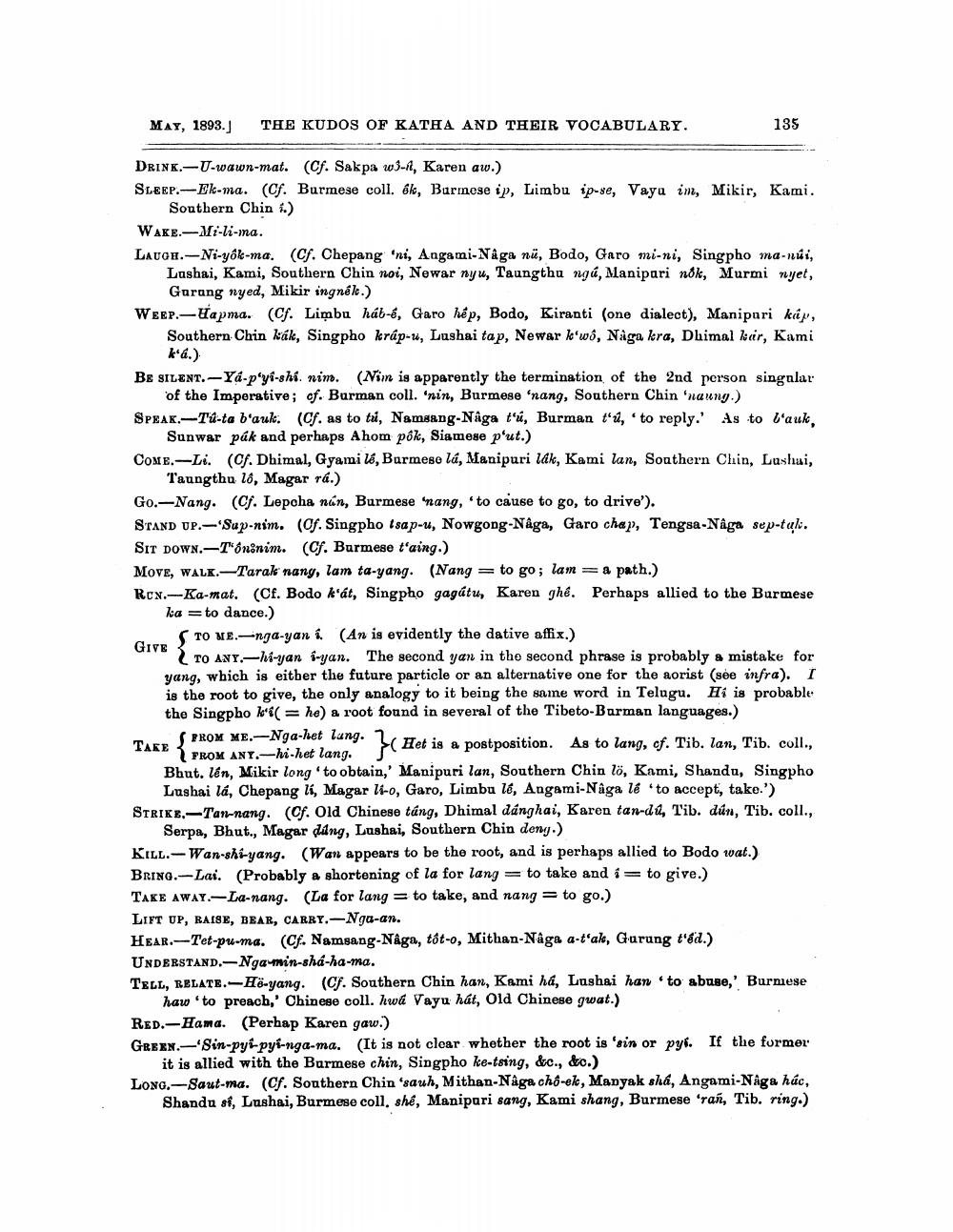________________
MAY, 1893.
THE KUDOS OF KATHA AND THEIR VOCABULARY.
135
DRINK.-U-wawn-mat. (Cf. Sakpa w3-1, Karen aw.) SLEEP.-Ek-ma. (cf. Burmese coll. ék, Barmese ip, Limbu ip-se, Vaya in, Mikir, Kami.
Southern Chin 1.) WAKE.-Mi-li-ma. LAUGH.-Ni-yók-ma. (Cf. Chepang ini, Angami-Naga nü, Bodo, Garo mi-ni, Singpho ma-núi,
Lashai, Kami, Southern Chin noi, Newar nyu, Taungthu ngá, Manipuri nok, Murmi nyet,
Gurang nyed, Mikir ingnék.) Weep.-Hapna. (Cf. Limbu háb-é, Garo hép, Bodo, Kiranti (one dialect), Manipari kip,
Southern Chin kák, Singpho kráp-u, Lushai tap, Newar k'wÔ, Någa kra, Dhimal kar, Kami
kia.) BE SILENT.-Ya-p'yi-shi, nim. (Nim is apparently the termination of the 2nd person singular
of the Imperative; cf. Burman coll. 'nin, Burmese 'nang, Southern Chin 'naung.) SPEAK.-Tu-ta bauk. (Cf. as to tú, Namsang-Naga tú, Burman t'u, to reply.' As to lauk,
Sunwar pák and perhaps Ahom pôk, Siamese p'ut.) COME.--Li. (Cf. Dhimal, Gyamilé, Burmese lá, Manipuri lák, Kami lan, Southern Chin, Lashai,
Taungthu 18, Magar rá.) Go.-Nang. (Cf. Lepoha nún, Burmese 'nang, 'to cause to go, to drive'). STAND UP.-Sup-nim. (Of. Singpho isap-u, Nowgong-Naga, Garo chap, Tengsa-Naga sep-tal. SIT DOWN.-T*nonim. (Cf. Burmese t'aing.) MOVE, WALK.Tarak nang, lam ta-yang. (Nang = to go; lam = a path.) Rox.--Ka-mat. (Cf. Bodo k‘át, Singpho gagátu, Karen ghê. Perhaps allied to the Burmese
ka = to dance.) STO ME.-nga-yan (An is evidently the dative affix.)
TO ANY.-hi-yan iyan. The second yan in the second phrase is probably a mistake for yang, which is either the future particle or an alternative one for the aorist (see infra). I is the root to give, the only analogy to it being the same word in Telugu. Hi is probable the Singpho k'(= he) a root found in several of the Tibeto-Burman languages.) PROM ME.-Nga-het lung. 2
(Het is a postposition. As to lang, cf. Tib. lan, Tib. coll., * PROM ANY.-hi-het lang. S .
Bhut. lén, Mikir long to obtain,' Manipuri lan, Southern Chin lö, Kami, Shandu, Singpho
Lushai lá, Chepang lí, Magar l-o, Garo, Limbu lé, Angami-Naga le to accept, take.') STRIKE,-Tan-nang. (Cf. Old Chinese táng, Dhimal dánghai, Karen tan-da, Tib. dún, Tib. coll.,
Serpa, Bhut., Magar ding, Lushai, Southern Chin deng.) Kill.-Wan-shi-yang. (Wan appears to be the root, and is perhaps allied to Bodo wat.) Bring.-Lai. (Probably a shortening of la for lang = to take and i= to give.) TAKE AWAY.-La-nang. (La for lang = to take, and nang = to go.) LIFT UP, RAISE, BEAR, CARRY.-Nga-an. HEAR.-Tet-pu-ma. (Cf. Namsang-Naga, tot-o, Mithan-Någa a-t'al, Gurung t'éd.) UNDERSTAND.-Nga min-sha-ha-ma. TELL, RELATE.-Hö-yang. (Cf. Southern Chin han, Kami há, Lushai han to abuse,' Burmese
haw 'to preach,' Chinese coll. nwa Vayu hát, Old Chinese gwat.) RED.-Hama. (Perhap Karen gaw.) GREEN.-Sin-py-pyi-nga-ma. (It is not clear whether the root is 'sin or pyt. If the former
it is allied with the Burmese chin, Singpho ke-tsing, &c., &c.) LONG.-Saut-ma. (Cf. Southern Chin ‘sauh, Mithan-Naga chô-ek, Manyak shá, Angami-Naga hác,
Shandu si, Lashai, Burmese coll, shé, Manipari sang, Kami shang, Burmese 'ran, Tib. ring.)




